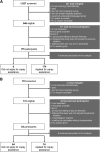The financial toxicity of cancer treatment: a pilot study assessing out-of-pocket expenses and the insured cancer patient's experience
- PMID: 23442307
- PMCID: PMC3639525
- DOI: 10.1634/theoncologist.2012-0279
The financial toxicity of cancer treatment: a pilot study assessing out-of-pocket expenses and the insured cancer patient's experience
Abstract
Purpose: Cancer patients carry rising burdens of health care-related out-of-pocket expenses, and a growing number of patients are considered "underinsured." Our objective was to describe experiences of insured cancer patients requesting copayment assistance and to describe the impact of health care expenses on well-being and treatment.
Methods: We conducted baseline and follow-up surveys regarding the impact of health care costs on well-being and treatment among cancer patients who contacted a national copayment assistance foundation along with a comparison sample of patients treated at an academic medical center.
Results: Among 254 participants, 75% applied for drug copayment assistance. Forty-two percent of participants reported a significant or catastrophic subjective financial burden; 68% cut back on leisure activities, 46% reduced spending on food and clothing, and 46% used savings to defray out-of-pocket expenses. To save money, 20% took less than the prescribed amount of medication, 19% partially filled prescriptions, and 24% avoided filling prescriptions altogether. Copayment assistance applicants were more likely than nonapplicants to employ at least one of these strategies to defray costs (98% vs. 78%). In an adjusted analysis, younger age, larger household size, applying for copayment assistance, and communicating with physicians about costs were associated with greater subjective financial burden.
Conclusion: Insured patients undergoing cancer treatment and seeking copayment assistance experience considerable subjective financial burden, and they may alter their care to defray out-of-pocket expenses. Health insurance does not eliminate financial distress or health disparities among cancer patients. Future research should investigate coverage thresholds that minimize adverse financial outcomes and identify cancer patients at greatest risk for financial toxicity.
Conflict of interest statement
Disclosures of potential conflicts of interest may be found at the end of this article.
Figures



References
-
- Schoen C, Doty MM, Robertson RH, et al. Affordable Care Act reforms could reduce the number of underinsured US adults by 70 percent. Health Aff (Millwood) 2011;30:1762–1771. - PubMed
-
- Langa KM, Fendrick AM, Chernew ME, et al. Out-of-pocket health-care expenditures among older Americans with cancer. Value Health. 2004;7:186–194. - PubMed
Publication types
MeSH terms
LinkOut - more resources
Full Text Sources
Other Literature Sources
Medical

